Same-Day COVID Testing for Travelers
In light of the Delta variant, Mu variant, and breakthrough cases in vaccinated individuals, COVID-19 still presents a challenge for travelers. Requirements change quickly and vary by country or region. One of the biggest challenges is making sure travelers can be tested and receive test results quickly enough, since the longer someone has to wait for test results, the longer they have to isolate themselves to avoid becoming infected between testing and departure.
If you’re planning a trip and need a negative COVID test to board the plane, check out our 24-hour and same-day COVID tests for travel.
IGeneX COVID-19 Airline Travel Program
IGeneX offers two different expedited COVID-19 RT-PCR tests for travelers or anyone with time-sensitive testing needs. Learn how they work and how to order one below.
How the tests work
IGeneX’s COVID tests for travel are RT-PCR tests – the most reliable type of test for COVID-19. By contrast, most rapid COVID-19 tests are antigen tests, which are statistically less reliable and more likely to result in false negatives. With a rapid RT-PCR test from IGeneX, you can feel safer and more certain about your results. Several countries require the RT-PCR tests over the unreliable rapid antigen tests.
Patients have two options:
- 24-hour test results
- Same-day test results
Both tests are self-swab nasal tests performed on-site at the IGeneX lab in Milpitas. No special preparation, such as fasting, is needed. Simply show up at the drive-thru tent a few minutes before your appointment time, prepare to show verification of your appointment, and follow the staff’s instructions on using the self-swab kit. Results will be sent via secured email within the specified time (24 hours or the same day as testing).
How to order a test
First, read the overview of the IGeneX COVID-19 expedited test options. Once you’ve chosen your test, scroll down and click the button for either 24-hour or same-day results.
Note:
- Tests must be ordered at least one day in advance.
- Testing is performed on-site at the IGeneX headquarters in Milpitas.
- At this time, IGeneX cannot assist with travel to Hawaii or China. Check the IGeneX website for updates.
- IGeneX will prepare the additional ‘Certificate of Testing for COVID-19’ for travelers to Japan, and meet other special paperwork requirements for different countries, at no additional cost.
Current risks & concerns
The Delta variant
Delta is currently the predominant variant of the virus in the United States, according to the CDC. The Delta variant is more contagious than previous variants – in other words, it spreads faster and causes more infections. The CDC also reports that it may cause more severe illness in unvaccinated people than previous variants.
Though breakthrough cases are possible (more on that below), the CDC emphasizes that vaccines are effective against all variants of the COVID-19 virus, including the Delta variant. They report that the majority of current hospitalizations are unvaccinated people and that unvaccinated people remain at the greatest risk for severe cases.
Breakthrough cases
Since vaccine rollouts began in Spring, there have been some “breakthrough cases,” or cases of COVID-19 occurring in people who have been vaccinated.
Many of these cases are milder than cases in unvaccinated people, and research suggests that vaccinated people who catch the virus may be contagious for shorter periods of time than unvaccinated people. However, vaccinated people with symptomatic cases can still transmit the disease to others. (Researchers are not sure if vaccinated people with asymptomatic cases are contagious.)
Ultimately, caution – such as wearing masks indoors – is still advised even for those who have been vaccinated.
“Long COVID”
There is also increasing evidence of what doctors call “long COVID” or “long-haul COVID.” These are cases in which people experience symptoms weeks to months after COVID has seemingly resolved. One NPR article features a woman who started experiencing chronic burning sensations, tingling, and numbness in her hands and feet after confirming the resolution of her COVID-19 symptoms with a negative test.
While long COVID is still a new, poorly defined category of illness, many researchers are paying attention to the phenomenon, and some suggest it may be the result of an autoimmune response. Cases of long COVID have been documented in both vaccinated and unvaccinated individuals, though as mentioned, unvaccinated people are still at the greatest risk.
IGeneX COVID Testing
IGeneX is dedicated to staying on top of current COVID-19 data as well as safety advisories and travel policies. In addition to same-day COVID testing for travelers, IGeneX offers several tests for active COVID infections as well as an immune response test to measure the level of your antibodies from the vaccine or a natural infection. Learn more about the tests and how to order one today.






